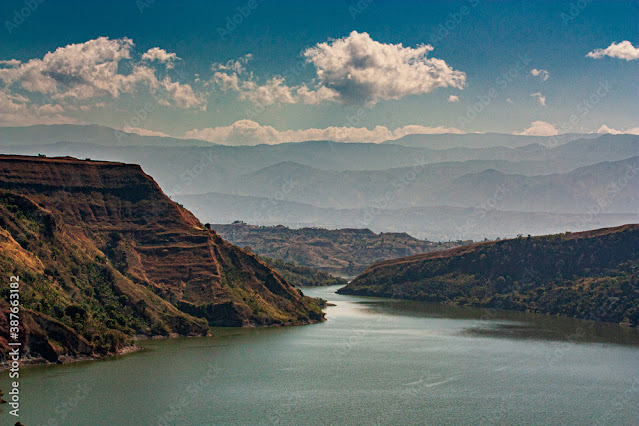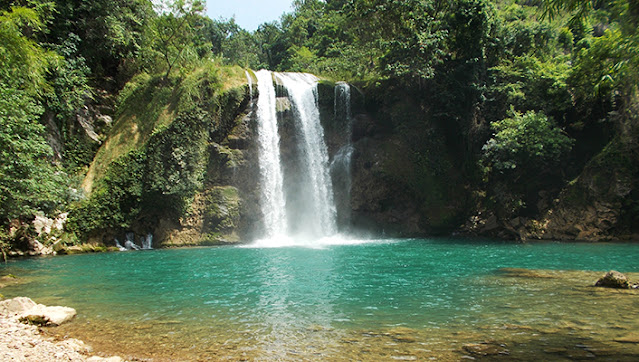From the editor: With the recent political focus on the diet of Haitian immigrants in Springfield, Ohio, I've tried to learn a bit more about Haiti.
For the last few days I've been reading the history of Haiti from several sources, while a 70"monitor one of my grandsons set up for me, blares YouTube documentaries chronicling the same.
While most of us recall the devastating 2010 earthquake that destroyed 80% of Haiti's schools, 50% of its hospitals, 60% of its infrastructure, killing 316,000, while leaving 1,500,000 homeless, the primary reason for Haiti's poverty is the work of three industrialized countries.
It's a long, tedious story and my coverage below will have gaps and likely oversimplifications, but what clearly comes across is the greed, amoral behavior of three countries, Spain, France and the United States, who ruthlessly ravaged a country that was at one time the richest in the hemisphere and is now the poorest.
On October 12, 1492 Christopher Columbus "discovered" an island in the Caribbean he named Hispaniola or "Little Spain," claiming it for his country, although it was already inhabited by as many as 800,000 indigenous Taino people.
Spain's military "conquered" the island reducing the Taino to a mere 500, stole as much gold as they could, but quickly left for Mexico and Peru where gold and silver were more easily acquired.
In the 1750's Hispaniola, with mineral resources and a wonderful climate and soil producing coffee, sugar, cacao, indigo, cotton and other crops, had more wealth than the United States and France and roughly half of all the wealth in the Spanish Empire, wealth totally controlled by the slave masters and plantation owners.
With the departure of the Spanish, the French came to exploit Hispaniola's wealth, shipping cash crops to France that accounted for 1/2 of France's GNP.
Of course, the French had no interest in working the fields themselves and so imported between 790,000 and 860,000 African slaves to their portion of Hispianola they renamed Saint-Domingue, now Haiti.
Both the slave ships and plantations were places of incredible violence, hardship, disease with a high mortality rate, prompting the French to import more and more African slaves.(The life expectancy of a slave transported from Africa to Saint Domingue was only 2 to 3 years. For an enslaved person born in the colony, life expectancy was 16 years.)
Slaves in Saint Domingue were killed, dehumanized and chained together like animals.
Starting in 1791, the slaves in Saint Dominque, led by a coalition of African slaves and the children of slave women and their plantation masters, led a revolution(1791-1804) that eventually gained control, renaming their part of the island Haiti.
Yet, the new country, Haiti, the first Black country in the Western Hemisphere and the first successful revolution of African slaves, was embargoed by its rich, former masters with no country willing to trade with the newly formed Black country because of obvious racism.
France did come up with a self-serving plan to offer diplomatic relations with Haiti in exchange for 150,000,000 francs in reparations for France's "lost revenue,"including the loss of slaves.
Yes, it was an immoral, bullshit deal, but the only way for Haiti to survive as a country.
Haiti taxed its citizens heavily to pay the exorbitant French demand, with most of workers' tax dollars going toward the "indemnity," leaving little for much-needed schools, hospitals, etc.
Not being able to meet the annual monetary demand, Haiti was forced to take out high interest loans, considerably adding to the country's indebtedness.
It took 122 years, but Haiti paid off its indebtedness to France, a total of $21B according to the New York Times.
In 1915, U.S. President Woodrow Wilson sent 330 marines to Haiti's capital, Port-au-Prince to "restore order."
The U.S. had an ulterior motive, hoping to use Haiti as a strategic naval base, but their first order of business was to transfer $500,000 in gold from the Haiti National Bank to New York's CitiCorp for "safekeeping," money that I find no reports that it was ever returned.
The United States was also concerned about France's influence just 200 miles south of Miami and a growing involvment by Germany.
German men were marrying Haitian women so as to circumvent the rules against foreigners owning or controlling property in Haiti.
 |
| Haiti's Artibonite River |
Unfortunately, the U.S. military set up camp adjacent to Haiti's beautiful Artibonite River, where they dumped their raw, cholera-contaminated sewage, spreading cholera in Haiti resulting in over 10,000 deaths.
After the American occupation, the first president of Haiti was Dumarsis Estime, eventually succeeded by Francois Duvalier, one of the most corrupt and repressive leaders of modern times.
Duvalier was succeeded by his son, Jean-Claude, who governed more moderately, but still oversaw a tremendous decline in Haiti's economy.
Jean-Bertrand Aristide followed until a 2004 coup d'etat.
In 2010 a 7.0 magnitude earthquake caused tremendous destruction, as we noted in our prologue, with 80% of schools, 50% of hospitals and 60% of infrastructure destroyed.
While $16B in relief efforts were committed to Haiti following the earthquake, $5.6B from the U.S. alone, NONE of those monies were ever used to rebuild anything in Haiti, a country still remaining in total disrepair.
Monies funneled through the United Nations' NGO's(non-governmental organizations) were totally lost to corruption.
Although I don't have the disposable income he has, I totally respect Charles Barkley's approach to charities. Rather than give to the established, frequently scam charities where 90%+ of your contribution goes to "administrative costs", Barkley just goes to a poor community and builds 3 or 4 homes and deeds them to the needy eliminating the scamming charity middle man.
 |
| Timmy Karter crossing the 91 mile Darien Gap last year |
That brings us to today as I follow Timmy Karter, a tall, lanky YouTuber from Greece in his mid-twenties who speaks English, Spanish, Portuguese and Greek and has been across Russia, most of Europe and nearly all of Latin America.
He's now going through the most dangerous parts of Haiti with a guide and has scheduled a meeting with the country's top gang leader.
Haiti has no government and the former government buildings are controlled by the gang who will shoot anyone getting in range.
The country is worse than ever with no services.
Garbage is being burned in the street.
There is no work.
Nothing works and nothing is being repaired.
Yet, Timmy, who's being given a tour of the country's capital by a group of young Haitian men, says this: "These guys are as smart as me or smarter, as strong as me or stronger, yet they live in total shit because of where they were born."
Timmy tours the living quarters of some young men in Haiti living in a large room with bedsheets hanging from the ceiling as room dividers.
"Where do you sleep?" he asks and the guys point to the concrete floor.
"Where do you cook?" he asks and they point to the same place.
Many of Springfield, Ohio's residents seem to echo Timmy's appraisal of Haitians, finding them hardworking, honest citizens who do their jobs well and contribute to the community.
People who've escaped from a veritable war zone with no jobs, no opportunities and no future tend to appreciate life in small town U.S.A.




.jpeg)

.webp)
.webp)


.png)

No comments:
Post a Comment